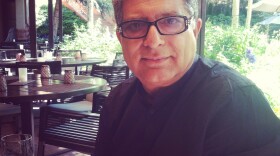Dale Will spent a beautiful last day with his daughter Eva. She’d been struggling for some time.
“I expect you to outlive me,” he told her, as they walked the streets of Carbondale together. "And I expect to live to 100.”
Eva Denali Will couldn’t stand euphemisms; to her they were the grown up way of hiding from uncomfortable topics. In theobituary that ran in the Aspen Times one week later, her family wrote this of her. It read in part:
“Eva’s passion could be quite fierce, but was also absolutely beautiful in a profoundly wild way. Sadly for her friends and family, she was not able to complete the journey from child to woman. Eva was daunted by forces in the world and in her mind that stirred fury and dismay of dreadful proportions. In some senses we all share this painful journey; our inner child must face incorrigible issues that strike deeply at our innocence. For Eva, the transition to adulthood proved impossible. She will be greatly missed by many.”
For Dale Will and his family, publicly acknowledging Eva’s demons was the best way they felt they could honor her.

“That was a very conscious decision to not shy away from the subject of what had happened. One of the initial difficulties I had of trying to help Eva was dealing with the stigmas of what we call ‘mental illness,’” he said.
If you look at a map of the United States, the Roaring Fork Valley is in the center of a strip among western communities that experience the highest suicide rates in the country. While we have loved ones, friends and colleagues who have taken their lives, we don’t tend to talk about it. Will said it’s harmful to avoid the subject.
“I think that it’s commonplace that a family thinks that the revelation of someone in their family could have chosen to end their life is going to cast some sort of doubt over the entire family in a way that people are ashamed of,” Dale Will said. “And it’s the shame that drives everybody into this neurosis and psychosis, and I’m just not into this shame. I’m more into knowledge.”
Dr. Dan Reidenberg is the executive director of SAVE — Suicide Awareness Voices of Education — which is a national nonprofit working to prevent suicide. He has met with families who struggle with revealing the cause of death when loved ones have taken their own life.
“We are seeing more people acknowledge in obituaries the underlying cause of death being suicide,” he said. “Sometimes they will mention it as dying as a result of a mental illness or a result of depression. So we are seeing more of that than we did five, 10 years ago. It’s not new, it’s happened, but it’s increasing.”
Whitney Will is Eva’s older sister. Shewrote several versions of the eulogy she made during Eva’s memorial, knowing her sister couldn’t stand it when memorials smooth over the faults of those deceased.
“I have been struggling to know what to say here, should I address the darkness? Or only the light?” she said when she began the eulogy.
The ceremony was held at the Waldorf School of the Roaring Fork, where Eva had attended. A tree was planted on the grounds in her honor.

It’s not just in the obituary section where the word “suicide” has been traditionally left out. Until recently, it’s been journalistic practice not to report on self-inflicted deaths. But, in the newest update to the Society of Professional Journalists code of ethics, the topic came up with the ethics committee. Fred Brown is the co vice-chair of the group.
“I said, ‘why don't we include a sentence that says ‘don’t include suicide unless it's a public figure or a public place,’ and another member of the committee said ‘well, let's not get into that because the feeling is changing and the tradition is changing,’” Brown said.
The subject has been completely omitted in the current handbook, allowing newsrooms across the country to approach coverage based on their own communities and acknowledging that silence adds to stigma.
National Geographic journalist Kelly McMillion used the term “paradise paradox” earlier this year when reporting on the higher-than-average suicide rate in Colorado’s mountain towns. Social media feeds are filled with idealistic scenery and smiling adventure pictures. For those lacking an enthusiasm for life, it is hard to relate to the grab-life-by-the-horns attitude, and the pressure to always be having a good time.
Whitney Will said this falseness was among those things that plagued her sister. One of those things that as her obituary stated “made the transition to adulthood … impossible.”
“One of the things she hated about the adult world was its inauthenticity,” said Whitney Will.
In Eva’s obituary, Dale, Whitney and her mother, Gretchen, were mentioned by name and profession — each is highly involved in the community. Afterward, Dale heard from parents throughout the valley who shared their own experiences with him.
“I have to say, I was blown away by the amount of support that came to my family after this experience,” Dale Will said. “Every human is nursing a wound somewhere — it’s what defines us as humans. And yet, we share so little of our time in a vulnerable place where we can share that struggle.”




